Home » Jazz Articles » Building a Jazz Library » The Best of Basie
The Best of Basie

Basie broke up the band in 1950 and formed an all-star septet. But he missed the power and glory of sixteen men swinging, so in the fall of 1951 the Count began to reassemble his orchestra. Founded on an ever-growing book of first-rate charts by top-rung arrangers like Neal Hefti, Ernie Wilkins, and Quincy Jones, his new edition evolved into an ensemble of amazing strength and precision, but also one of many moods and colors, as strong at pianissimo as it was at fortissimo , as swinging at slow tempos as it was at fast ones. But make no mistake, this reborn unit was packed with accomplished soloists. One by one, the Count brought in trombonists Benny Powell, Henry Coker, and Al Grey, trumpeters Joe Newman and Thad Jones, and the tenor saxophone tandem of Frank Foster and Frank Wess, all modern, bop-inspired improvisors who also were completely at home in the Basie idiom.
Through the '60s, the '70s, and into the '80s, the Basie band remained the definition of big band jazz. And even after his death on April 26, 1984, The Count Basie Orchestra has continued to record and tour under the leadership of some of its most distinguished alumni: first Thad Jones, then Frank Foster, Grover Mitchell. Bill Hughes, Dennis Mackrel, and currently trumpeter Scotty Barnhart
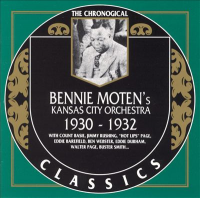 Bennie Moten
Bennie Moten1930-1932
Classics
1996)
From 1929 to 1935, Basie was the pianist in Bennie Moten's legendary Kansas City-based territory band. After the leader's death in 1935, Basie formed his own big band with many ex-Moten sidemen as its nucleus. The Moten band's most enduring number, "Moten Swing," would serve as Basie's first theme song.
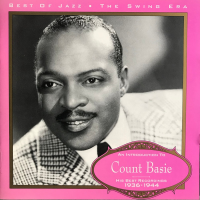 Count Basie
Count BasieAn Introduction to Count Basie: His Best Recordings, 1936-1944
Best of Jazz
1996
Basie's first band produced a string of jazz classics: "One O'clock Jump," "Jumpin' at the Woodside," "Swingin' the Blues," "Down for Double," etc. Many were collectively worked out "head arrangements," while others were crafted by such gifted writers as Eddie Durham, Buster Smith, and Buck Clayton.
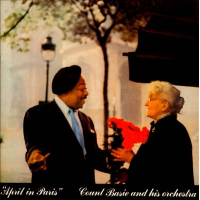 Count Basie
Count BasieApril in Paris
Verve
1955
After his brief small band hiatus during the early '50s, Basie returned to his favored format and picked up where he left off. This milestone album produced a major hit with the title track plus two more enduring Basie favorites, "Corner Pocket" and Frank Foster's masterpiece, "Shiny Stockings."
 Count Basie & Joe Williams
Count Basie & Joe WilliamsCount Basie Swings, Joe Williams Sings
Verve
1956
On Christmas Day 1954, singer Joe Williams began his six-year tenure with the Basie juggernaut. His debut recording with the Count, which still stands as a landmark jazz vocal album, presented Williams' hip, modern take on the blues and gave Basie another big hit with "Every Day I Have the Blues."
 Count Basie
Count BasieChairman of the Board
Blue Note
1958
This indispensable recording showcases the work of three brilliant arrangers from inside the band—saxophonists Frank Foster and Frank Wess, and trumpeter Thad Jones—plus ex-Basie saxophonist and frequent contributor Ernie Wilkins. It is, arguably, the finest album of big band jazz made during the LP era.
 Count Basie
Count BasieBreakfast Dance and Barbecue
Blue Note
1959
This live date is a favorite of Basie trombonist Benny Powell (who contributes a terrific solo on "In a Mellow Tone"). Performing in the wee, small hours—when Joe Williams sings, "It's five o'clock in the morning...," he's not kidding—Basie's men have even more fun than their grateful audience.
 Duke Ellington & Count Basie
Duke Ellington & Count BasieFirst Time! The Count Meets the Duke
Columbia
1961
This swinging summit conference combines the two greatest jazz orchestras of all time into a magnificent mega-ensemble with a dazzling array of distinctive soloists. The highlight is Thad Jones' lovely "To You," featuring Snooky Young's magnificent lead trumpet and Quentin Jackson's poignant trombone solo.
 Frank Sinatra & Count Basie
Frank Sinatra & Count BasieIt Might as Well Be Swing
Reprise
1964
No band was better suited to Sinatra's "ring-a-ding-ding" nonchalance, and no singer (except Joe Williams) was as comfortable with Basie's subtle, solid swing. The second of their three recorded collaborations offers a selection of great tunes from the early 1960s, arranged, with added strings, by Quincy Jones.
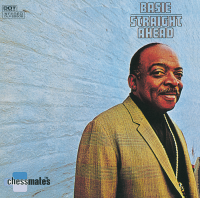 Count Basie
Count BasieStraight Ahead
GRP
1968
From 1968 to 1983 Sammy Nestico arranged ten albums for Basie. This date, his first for the band, demonstrates Nestico's talent for bringing a welcomed freshness to the familiar Basie idiom. As lead trombonist Grover Mitchell proudly declared at the time, "Best damn album we've made in five years!"
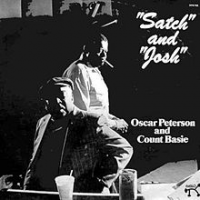 Count Basie & Oscar Peterson
Count Basie & Oscar PetersonSatch and Josh
Pablo/OJC
1974
At first, you might not expect this piano duo to work. After all, the flamboyant Peterson seems to play more notes in a single solo than the economical Basie did in his entire career. But Peterson proves a sensitive accompanist, and the interplay between these two keyboard giants is truly wonderful.
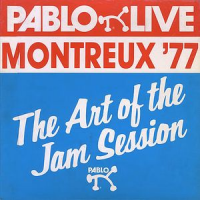 Count Basie
Count BasieCount Basie Jam: Montreux '77
Pablo/OJC
1977
An underrated pianist, Basie holds his own alongside trumpeter Roy Eldridge, trombonists Vic Dickinson and Al Grey, and saxophonists Benny Carter and Zoot Sims. And when the horns lay out on "Trio Blues," he steals the show. "We can't follow that, Bill!" Carter calls from the wings—and he's right.
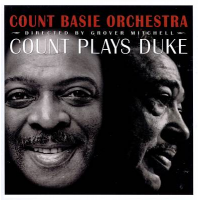 The Count Basie Orchestra
The Count Basie OrchestraCount Plays Duke
MAMA
1998
Almost four decades have passed since Basie's death. But The Count Basie Orchestra has kept on swinging, as it did on this Grammy Award-winning program of Ellingtonia under the direction of Grover Mitchell, arranged by Allyn Ferguson, and featuring special guest Frank Wess and Mitchell's smooth trombone.
< Previous
Galapagos
Comments
Tags
For the Love of Jazz
 All About Jazz has been a pillar of jazz since 1995, championing it as an art form and, more importantly, supporting the musicians who create it. Our enduring commitment has made "AAJ" one of the most culturally important websites of its kind, read by hundreds of thousands of fans, musicians and industry figures every month.
All About Jazz has been a pillar of jazz since 1995, championing it as an art form and, more importantly, supporting the musicians who create it. Our enduring commitment has made "AAJ" one of the most culturally important websites of its kind, read by hundreds of thousands of fans, musicians and industry figures every month.























